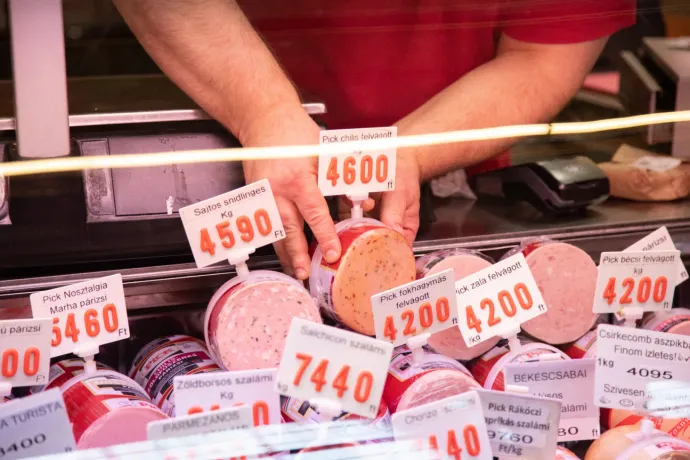A record of 26 years: inflation in Hungary 24.5 percent in December

Inflation in Hungary was 24.5% in December, which is a record high in more than 20 years and the highest in the European Union. As in previous months, food (44.8 percent) and utilities (55.5 percent) were the most expensive, with the monthly increase boosted by the lifting of the fuel price freeze in early December. The good news, however, is that inflation is unlikely to be much higher than this, and is expected to slow down substantially starting around the middle of the year. Annual inflation has reached 14.5%, according to the monthly flash report of the Hungarian Central Statistical Office (KSH). This is something which has not been seen since 1998.
In most parts of the world, inflation took off in mid-2021 and it reached Hungary within a very short time. In most places, including most European countries, it peaked last summer or autumn, while in the eurozone, for example, it has been on a downward trend since October and was only 9.2 percent in December.
For a number of reasons, since the very beginning, the eastern half of the EU has seen more price increases than the West, and Hungary was doing quite well in the region until last summer. We then shot up in July and August, and by the autumn, we had left the other V4 members far behind, and we now have the highest inflation rate in the EU.
Food is where it hurts the most
The price increases are most visible in the retail sector, where it is hard to miss that the price tags are sometimes changed every week. We noticed this when we bought the same things at Lidl in mid-December as a year earlier, and found prices up by around 50 per cent overall.
Not only does Hungary have the highest food price hikes in the EU, but it's also in the top 10 globally. There are many reasons for this, the most important of which are as follows:
- the depreciation of the forint, which makes all imported products/raw materials/energy used for production more expensive;
- due to the government’s pre-election handouts and the price caps, demand was high;
- the Hungarian food industry is not efficient enough;
- price increases that were previously canceled are now being made up for; and
- shops are making up for the cost lost on price caps on other products.
The latter is crucial, as retailers are making gigantic losses because of the price caps, but there is no stopping them from making it up on other products, even many times over. Whether they have made back more or less will only be known next year, when their results are published, but it is certain that everything has become horrendously expensive this year, except for products that the government put a price freeze on.
Experts are divided on the overall impact of the price caps: while the government believes that they help reduce inflation, György Matolcsy, Governor of the Central Bank (MNB) is of the opinion that they are "causing an inflation surplus of 3-4%, so they should be phased out immediately". The President of the Chamber of Commerce and Industry, László Parragh, and the National Trade Association are also in favor of phasing them out.
The rise in food prices is affecting many people, and in recent months buying groceries has become increasingly difficult even for some who have a job or are retired, i.e. they have a regular income. It's no coincidence that shoplifting was up 22.4 percent in the first 11 months of 2022 compared to the same period of the year before.
It all started after Covid
The global increase in prices started in 2021, at the end of the third wave of the coronavirus epidemic. A lot of things suddenly became more expensive, because the shutdown caused a drop in production, but once production resumed, it brought a surge in demand. Increases in transport costs, the price of raw materials and energy prices gradually trickled down into everything else.
This was made worse by the Russian-Ukrainian war in early 2022 and the unprecedented drought last summer. In Hungary, the depreciation of the forint, the price caps and the government's pre-election handouts added to the problem. The Central Bank (MNB) tried to curb this by raising the base rate significantly, but as the result shows, this was not hugely successful.
For more quick, accurate and impartial news from and about Hungary, subscribe to the Telex English newsletter!